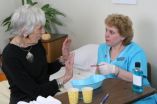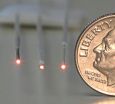Screening very preterm infants for autism at 18 months often inaccurate
Research suggests it may be better to postpone screening until 30 months of age for this high-risk population
2011-05-01
(Press-News.org) DENVER – Extremely premature infants who screen positive for autism spectrum disorder (ASD) at 18 months of age may not actually have autism. Rather, they may fail screening tests due to an unrelated cognitive or language delay, according to research to be presented Sunday, May 1, at the Pediatric Academic Societies (PAS) annual meeting in Denver.
An estimated one in 110 U.S. children has ASD, a group of complex developmental brain disorders that affect behavior, social skills and communication. The American Academy of Pediatrics (AAP) recommends that pediatricians screen all children for ASD at 18-24 months of age, and those who fail the screening test should be referred for a formal assessment.
Based on the AAP guidelines, many neonatal intensive care unit follow-up clinics that monitor former extremely preterm infants have instituted this screening protocol. However, it is not known how accurate early screening is in identifying ASD in this high-risk population.
Researchers, led by Bonnie E. Stephens, MD, FAAP, assistant professor of pediatrics at Brown University's Alpert School of Medicine and neonatologist/developmental and behavioral pediatrician at Women & Infants Hospital of Rhode Island, suspected that many preterm infants who screen positive for ASD at 18 months do not have ASD but are failing these screens due to a cognitive or language delay, both of which are common in extremely preterm infants at 18 months.
To test their hypothesis, the investigators screened infants born at their hospital before 28 weeks' gestation with three measures, one of which was designed specifically for use in high-risk populations such as preterm infants. They sought to determine the rate of false-positive screens for ASD at 18 and 30 months of age and to explore the relationship between a positive screen and cognitive and language delay.
A total of 152 infants were screened for ASD at 18 months (age corrected for prematurity), and 116 infants were screened at 30 months corrected age.
Results showed that 18 percent screened positive for ASD at 18 months, while 10 percent screened positive at 30 months. Only 3 percent of infants had positive results on all three screens at either point in time, and all of the infants who screened positive for ASD on all three screening tests at 30 months were later diagnosed with ASD.
In addition, a positive screen at 18 or 30 months was associated with cognitive and language delay.
"While these findings have important implications, further work is needed," Dr. Stephens said. "To determine which of these infants actually have ASD, a study that includes a formal diagnostic assessment on all children with a failed screen is needed."
Dr. Stephens and her colleagues are seeking funding to support a multicenter study of more than 500 preterm children. "This will allow us to determine the true rate of ASD in this population, the rate of false-positive screens at 18 and 30 months, the optimal time to screen, and the optimal ASD screening tool for the extremely preterm population."
###
To view the abstract, go to http://www.abstracts2view.com/pas/view.php?nu=PAS11L1_1058.
The Pediatric Academic Societies (PAS) are four individual pediatric organizations who co-sponsor the PAS Annual Meeting – the American Pediatric Society, the Society for Pediatric Research, the Academic Pediatric Association, and the American Academy of Pediatrics. Members of these organizations are pediatricians and other health care providers who are practicing in the research, academic and clinical arenas. The four sponsoring organizations are leaders in the advancement of pediatric research and child advocacy within pediatrics, and all share a common mission of fostering the health and well being of children worldwide. For more information, visit www.pas-meeting.org. Follow news of the PAS meeting on Twitter at http://twitter.com/PedAcadSoc.
END
ELSE PRESS RELEASES FROM THIS DATE:
2011-05-01
VIDEO:
Exposure to secondhand smoke, even at extremely low levels, is associated with increased blood pressure in boys, according to new research being presented Sunday, May 1, at the Pediatric Academic...
Click here for more information.
DENVER – Exposure to secondhand smoke, even at extremely low levels, is associated with increased blood pressure in boys, according to new research being presented Sunday, May 1, at the Pediatric Academic Societies (PAS) annual meeting in ...
2011-05-01
Exposure to the chemical bisphenol A during early pregnancy may be associated with wheezing in children, according to a Penn State College of Medicine researcher.
Bisphenol A, or BPA is a chemical found in many consumer products, including plastic water bottles and food containers. It is present in more than 90 percent of the U.S. population, suggesting widespread exposure. Experimental research suggests that prenatal BPA exposure causes asthma in mice, but no data exists for humans.
Adam Spanier, M.D., Ph.D., assistant professor of pediatrics, studied 367 children, ...
2011-05-01
It can be quite jarring for a parent or caregiver to look in the rearview mirror while driving and see their child roaming around the backseat free of their safety restraints. A study on child self-unbuckling by Yale School of Medicine researchers reveals that most children who first unbuckle were age three and under and that many children unbuckle while the vehicle is in motion—putting them at a 3.5-fold increased risk for serious injuries.
"We found that young children might acquire the motor skills to unbuckle from restraints before developing the cognitive ability ...
2011-05-01
If you have knowledge of fraud against the government, you can become a whistleblower and file a qui tam lawsuit. Under the False Claims Act, whistleblowers can file claims on behalf of the government to recover lost money from the fraudulent actions of the defendant. These are very complex claims and require the assistance of an experienced qui tam attorney.
Where and When to File your Qui Tam Lawsuit
The False Claims Act is a federal law, and as a result, your case can generally be filed in a federal court. However, some states have also enacted their own False ...
2011-05-01
Nurses who care for patients with dementia now have a tailored approach to dental hygiene for their charges, thanks to a pilot study by a team of nurses.
"Poor oral health can lead to pneumonia and cardiovascular disease as well as periodontal disease," said Rita A. Jablonski, even though these illnesses are not usually associated with the mouth. According to Jablonski, assistant professor of nursing, Penn State, persons with dementia resist care when they feel threatened. In general, these patients cannot care for themselves and need help.
Jablonski and her team introduced ...
2011-05-01
Science is finally confirming what grandma knew all along: infants wake up taller right after they sleep.
Findings from the first study of its kind measuring the link between daily growth and sleep show the two are inextricably linked. Specifically, growth spurts are tied to an increase in total daily hours of sleep as well as an increase in the number of daily sleep bouts, the time from the onset of sleep until awakening.
"Little is known about the biology of growth spurts," says Michelle Lampl, MD, PhD, Samuel C. Dobbs professor of anthropology, Emory University, ...
2011-05-01
Denver, Colo. (May 1, 2011) -- A drug commonly used to treat kidney cancer may increase the effectiveness of chemotherapy for mesothelioma, according to a study published in the May issue of the Journal of Thoracic Oncology.
Temsirolimus, a kinase inhibitor, blocks the action of mammalian target of rapamycin (mTOR), a protein that regulates cell growth, which can slow tumor growth. It's used to treat advanced renal cell carcinoma.
But researchers in Austria have found that temsirolimus also may slow the growth of malignant pleural mesothelioma cells. Mesothelioma, a ...
2011-05-01
A new kind of sensor could warn emergency workers when carbon filters in the respirators they wear to avoid inhaling toxic fumes have become dangerously saturated.
In a recent issue of the journal Advanced Materials, a team of researchers from the University of California, San Diego and Tyco Electronics describe how they made the carbon nanostructures and demonstrate their potential use as microsensors for volatile organic compounds.
First responders protect themselves from such vapors, whose composition is often unknown, by breathing through a canister filled with ...
2011-05-01
There has been numerous requests from Hawaii residents for a kama'aina discount for the "Invitation To Foodies" culinary seminar at the Makena Beach and Golf Resort on Maui. This seminar benefits three Maui non-profits. The non-profits are the Friends of the Children's Justice Center of Maui, Haku Baldwin Center and Ka Lima O Maui.
As sponsors of the event, TasteHawaiiOnline.com had to first consider how a discount would affect the quality of the seminar, the lecturers, the presentations and the food.
Local chef personalities are asked to share their knowledge ...
2011-05-01
Each May, since 1988, National Foster Care Month has raised awareness for millions of Americans across the country. Originally purposed to recognize and show appreciation to foster parents throughout the nation, National Foster Care Month has transferred that focus towards the needs of the children, specifically the teenagers, aging out of the system. Today, National Foster Care Month continues to broaden awareness, uniting individuals and organizations through strong support and recruitment programs nationwide.
When parents can not keep their children due to crisis, ...
LAST 30 PRESS RELEASES:
[Press-News.org] Screening very preterm infants for autism at 18 months often inaccurate
Research suggests it may be better to postpone screening until 30 months of age for this high-risk population

